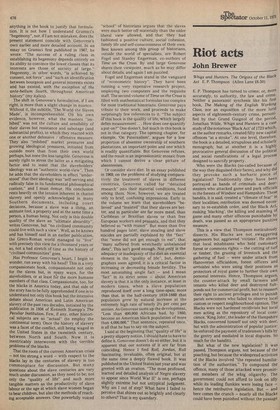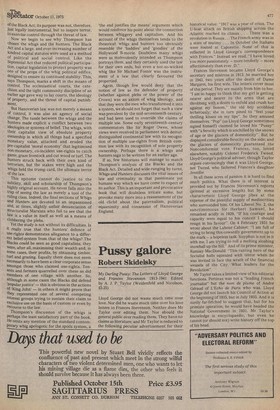Riot acts
John Brewer
Whigs and Hunters. The Origins of the Black Act E. P. Thompson (Allen Lane £6.50)
E. P. Thompson has turned to crime; or, more accurately, to authority, the law and crime. Neither a panoramic synthesis like his first book, The Making of the English Working Class, nor an exposition of the more lurid aspects of eighteenth-century crime, personified by that Grand Guignol of the period, Jonathan Wilde, Whigs and Hunters is a case study of the notorious 'Black Act' of 1723 which, as the author remarks, created fifty new capital offences "at a stroke". At one level, therefore, the book is a detailed, scrupulous and scholarly monograph; but at another it is a highlY provocative general discussion of the political and social ramifications of a legal process designed to sanctify property. Who were the Blacks (so-called because of the way they disguised their faces), and why did they provoke such a barbaric piece of legislation? Traditionally they have been portrayed as bands of criminals and deerstealers who attacked game and park officials' in the forests of Windsor and Hampshire. These bandits, it is said, created a "climate of fear" le their localities; retribution was deemed necessary to re-establish order, and the Black Act, making 'blacking', the killing and maiming of game and many other offences punishable by death, was passed as an appropriate punitive measure.
This is a view that Thompson meticulously dissects. His Blacks are not swaggering aggressors but aggrieved 'victims'. He shows that local inhabitants who held customarY forest or commons rights — the cutting of turf or timber, the grazing of livestock and the gathering of fuel — were under attack from Hanoverian officialdom, forest officers and arrivistei who were using their positions as protectors of royal game to further their own personal interests. Hence, Thompson argues, the counter-attack by small farmers and tenants who killed deer and destroyed fishponds not for commercial profit, but to reassert their right to ancient privileges and to punish parish newcomers who failed to observe local custom or respect neighbourhood opinion. The Blacks were not hardened recidivists but local men acting as the repository of local conscience. 'King John', the leader of the Hampshire Blacks, concerned himself not only with deer, but with the administration of popular justice: he enforced the payment of tradesmen's bills by the gentry and mediated in local disputes. So much for the banditti.
But what of the new legislation? It was passed, Thompson argues, not because of the poaching, but because the widespread activities of the Blacks involved "the repeated humiliation of the authorities." To compound the offence, many of those attacked were prominent members of the whig oligarchy. The government could not afford to look on idly while its leading flunkies were losing face — hence the retributive legislation. But — and here comes the crunch — nearly all the Blacks could have been punished without the passage
of the Black Act; its purpose was not, therefore, Just legally instrumental, but to inspire terror, to exercise control through the threat of law.
Now we begin to see why Thompson has chosen the whigs and the hunters. The Black Act and a large, and ever-increasing number of kindred capital statutes were used as a method of political and social control. Like the Septennial Act that reduced political participation, capital legislation to protect property was one of the props of the whig political edifice, designed to ensure its continued stability. This, says Thompson, marks a shift in the means of control. The ecclesiastical courts, the catechism and the tight community discipline of an earlier age gave way to lay courts, the ideology of property, and the threat of capital punishment.
But Hanoverian law was not merely a means of control, it was also an agency of social Change. The tussle between the whigs and the hunters made explicit a conflict between two ideologies or systems of belief. The whigs, with their capitalist view of absolute property ownership in which all things had a specified monetary value, attacked and eroded the Pre-capitalist 'moral economy' that legitimised non-monetary, co-incident use-rights to catch game, graze livestock and cut wood or turf. The hunters struck back with their own kind of terrorism, but the stakes were high and the Whigs held the trump card, the ultimate terror of the law.
This epitome cannot do justice to the subtlety, skill and scholarship of Thompson's highly original account. He never falls into the trap of seeing the law as merely a tool of the ruling class. Indeed, the final sections of Whigs and Hunters are devoted to an impassioned and, at times, slightly unfair denunciation of structuralist Marxists who fail to see that the law is a value in itself as well as a means of Clobbering the plebs.
Yet the study is not without its difficulties. Is It really true that the hunters' defence of use-rights demonstrates allegiance to a different belief-system from that of the whigs? The Blacks could be seen as good capitalists; they were, after all, maximising their wealth and, in some cases, their profits, by obtaining timber, turf and grazing. Equally there does not seem necessarily to have been a clear corporate sense amongst those who claimed use-rights. Tenants and farmers quarrelled over these as did members of one village with another. So, although in some cases the Blacks did defend 'Popular justice' — this is obvious in the actions of 'King John' — in others it might prove that they represented one of several competing interest groups trying to sustain their claim to exclusive use on the basis of custom or even by recourse to the law.
Thompson's discussion of the whigs is Perhaps the least satisfactory part-of the book. He omits any mention of the standard contemPorary whig apologetic for the spoils system, a the end justifies the means' argument which would reinforce his point about the connection between whiggery and capitalism. And his account of the whigs themselves tends to the theatrical: whigs and hunters too obviously resemble the %addles' and 'goodies' of the Hollywood B-movie. Doubtless many whigs were as malevolently .intended as Thompson portrays them, and they certainly used the law for their own ends, but even a not-so-wicked whig like Sir Michael Foster was the instrument of a law that clearly favoured the propertied.
Again, though few would deny that the notion of law as the defender of property (whether against plebs or the power of the Crown) was an axiom of whig ideology, and that they were the men who transformed it into a system, we should not forget that such a view was prevalent by the mid-seventeenth century, and had been used to override the claims of multiple use. Some early seventeenth-century commentators like Sir Roger Owen, whose views were received in parliament with demur, distinguished continental law with its recognition of multiple use-rights from British common law with its recognition of sole property ownership. Perhaps there is a whigs and hunters saga to be written for an earlier age.
If so, few historians will manage to match Thompson's analysis of the Blacks and the Black Act. Detailed and wide-ranging by turns, Whigs and Hunters discusses the vital issues of law and criminality in that passionate yet humane way which we have come to expect of its author. This is an important and provocative book that will doubtless irritate some, but provoke many more into a reassessment of the old cliché about the paternalism, political equanimity and consensus of Hanoverian :England.



































 Previous page
Previous page